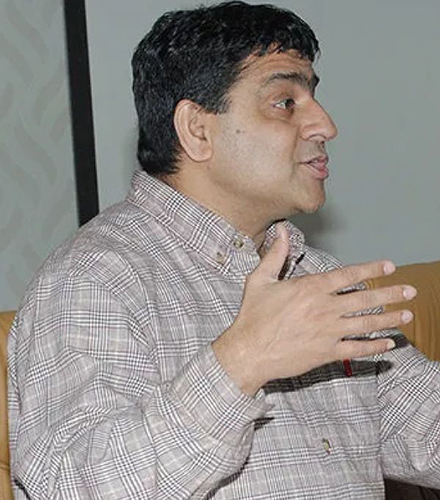Dr. Hemant Pendharkar, a professor in the Department of Mathematics and Statistics, was recently invited to deliver a keynote talk as part of Yeshwantrao Chavan College of Engineering (YCCE) 2nd International Faculty Development Program (IFDP). The event, which was held in April, focused on “21st Century: Recent Trends, Challenges, and Future Roadmap for Transitions in Technological Generations.”

Dr. Hemant Pendharkar, professor and campus associate chair, Department of Mathematics and Statistics. (Photo courtesy of Hemant Pendharkar)
According to YCCE, this year's IFDP was “an esteemed gathering to engage presentations on the aforesaid theme from prominent intellectuals, academicians, and industry experts for the professional development of faculty members from different institutions across India and around the world. The FDP aims to provide attendees from diverse engineering disciplines with broad perspectives and a vision for enhancing their research and development activities.”
Pendharkar was one of 17 speakers who delivered remarks to faculty members, industry experts, and researchers in engineering and science fields, with the goal of strengthening attendees’ understanding of applications of their respective domains of research in engineering, learning about recent trends and challenges in technological generations, and widening their perspective and vision for future research and development activities.
Specializing in operator algebras (C*-algebras), his keynote centered on applied algebra and algorithms and highlighted the philosophical aspects of discovering mathematical connections with quantum information theory.
Formally titled “Entanglement of Structures,” Pendhardkar explored a range of explorations from artists’ imagination to cyber security professionals’ dream security locks, and a few similar examples from other areas of industry. He also discussed mathematical considerations of embedding, entanglement, and separability from a philosophical perspective.
“Embedding may be considered in many different ways – given an object, how do you ‘insert’ another and have it sit seamlessly, but yet, bring its properties that did not (seem to) exist before? For example, vectors with integer coordinates (lattice points) don’t multiply, but when coordinates of vectors (lattice points) are considered as coefficients of polynomials, then with polynomial multiplication, we induce multiplication on lattice points,” Pendharkar explained. “Hard problems in lattices such as the shortest vector problem, or the closest vector problem were tackled by embedding specific collection polynomials, called ideals of polynomials.”
From an applied sense, Pendharkar shared that hard problems in lattices are being used for developing cryptographic protocols.
“Decryption is at least as hard as solving these seemingly impossible problems. And, in a way, by embedding certain ideals of polynomials, and solving these hard problems, we eliminate such ‘ideal’ lattices from being used in lattice-based cryptography. The work that I did in this area was supported by the Office of Naval Research Fellowship (Summers of 2016-2018) for my stay at the Space and Naval Warfare laboratory, Joint Base Charleston,” he said.
Pendharkar offered a comparison to such as it relates to an artist’s craft.
“It is a generally overused line: that Communication is over the internet – a channel that may be available for eavesdropping. But how about trying to precisely decode, nay replicate, how an artist comes up with a specific color using a combination of different colors? Different colors communicate but the channel of communication is within the artist’s imagination. Even the artist may not be able to replicate that combination precisely,” he explained.
Quantum information (entanglement and separability) seems to offer the path to such secrecy.
“Personally, in this lifetime, if I could get into the way of thinking of late Professor William Arveson and how he enjoyed writing his papers on this subject, as well as, how Adi Shankaracharya figured the Advaita Vedanta (अद्वैत वेदान्त) philosophy, it would address my restlessness.”